Challenges and Solutions: Nigeria's Oil and Gas Sector Report
VerifiedAdded on 2022/08/18
|44
|11735
|17
Report
AI Summary
This report provides a comprehensive analysis of the Nigerian oil and gas industry, examining its history, current challenges, and potential solutions. It delves into the impact of International Oil Companies (IOCs), the Nigeria Petroleum Act, and the Nigeria Local Content Development Act. The report identifies key challenges such as corruption, oil theft, government underfunding, inadequate refinery maintenance, and environmental pollution from oil spillage and gas flaring. It explores the factors affecting the industry and their economic consequences, including the impact on health, global warming, and the atmospheric layer. Furthermore, the report offers recommendations to address these issues and improve the industry's sustainability and contribution to the Nigerian economy. The report is well-researched, citing numerous sources to support its findings and recommendations.
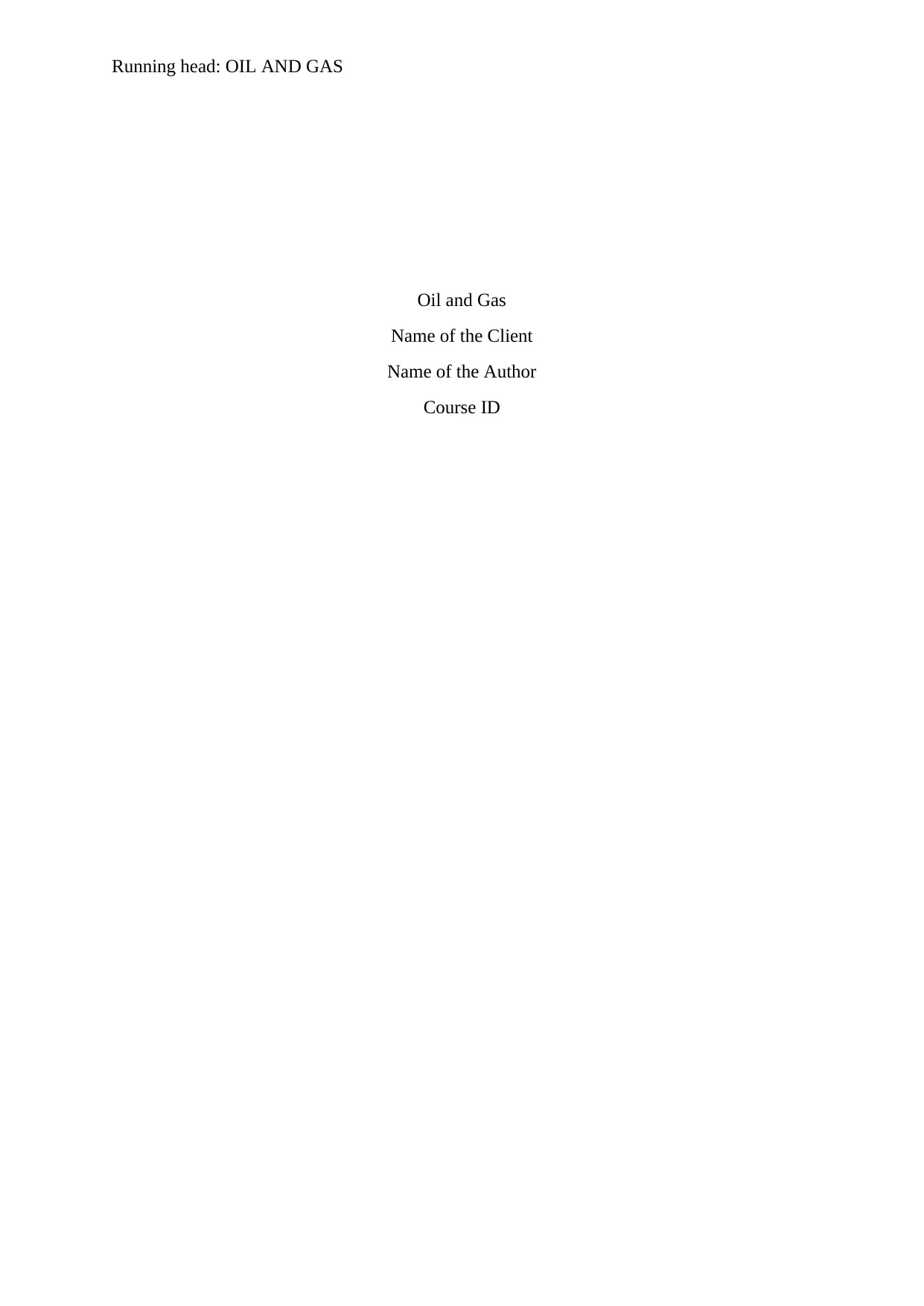
Running head: OIL AND GAS
Oil and Gas
Name of the Client
Name of the Author
Course ID
Oil and Gas
Name of the Client
Name of the Author
Course ID
Paraphrase This Document
Need a fresh take? Get an instant paraphrase of this document with our AI Paraphraser
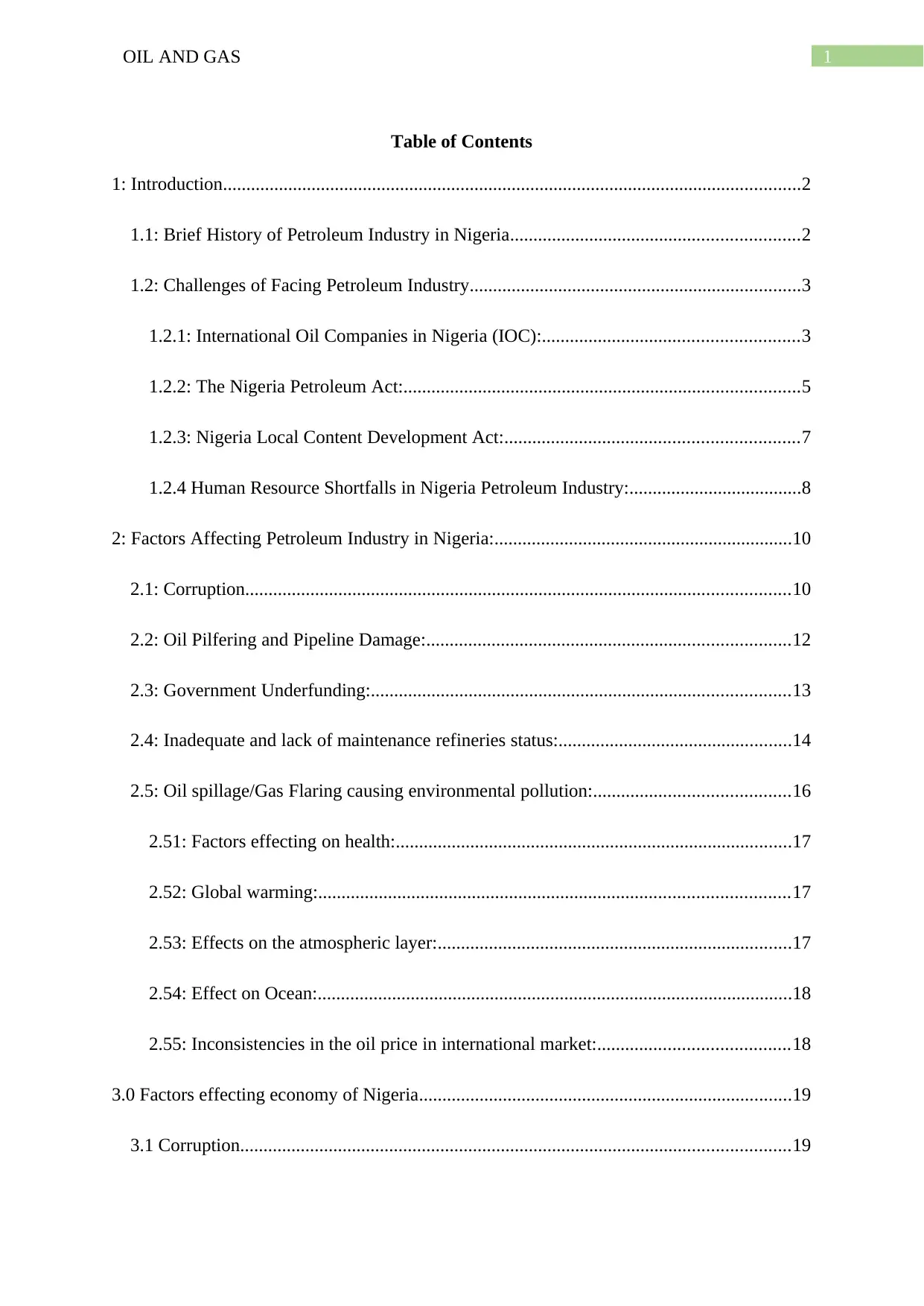
1OIL AND GAS
Table of Contents
1: Introduction............................................................................................................................2
1.1: Brief History of Petroleum Industry in Nigeria..............................................................2
1.2: Challenges of Facing Petroleum Industry.......................................................................3
1.2.1: International Oil Companies in Nigeria (IOC):.......................................................3
1.2.2: The Nigeria Petroleum Act:.....................................................................................5
1.2.3: Nigeria Local Content Development Act:...............................................................7
1.2.4 Human Resource Shortfalls in Nigeria Petroleum Industry:.....................................8
2: Factors Affecting Petroleum Industry in Nigeria:................................................................10
2.1: Corruption.....................................................................................................................10
2.2: Oil Pilfering and Pipeline Damage:..............................................................................12
2.3: Government Underfunding:..........................................................................................13
2.4: Inadequate and lack of maintenance refineries status:..................................................14
2.5: Oil spillage/Gas Flaring causing environmental pollution:..........................................16
2.51: Factors effecting on health:.....................................................................................17
2.52: Global warming:.....................................................................................................17
2.53: Effects on the atmospheric layer:............................................................................17
2.54: Effect on Ocean:......................................................................................................18
2.55: Inconsistencies in the oil price in international market:.........................................18
3.0 Factors effecting economy of Nigeria................................................................................19
3.1 Corruption......................................................................................................................19
Table of Contents
1: Introduction............................................................................................................................2
1.1: Brief History of Petroleum Industry in Nigeria..............................................................2
1.2: Challenges of Facing Petroleum Industry.......................................................................3
1.2.1: International Oil Companies in Nigeria (IOC):.......................................................3
1.2.2: The Nigeria Petroleum Act:.....................................................................................5
1.2.3: Nigeria Local Content Development Act:...............................................................7
1.2.4 Human Resource Shortfalls in Nigeria Petroleum Industry:.....................................8
2: Factors Affecting Petroleum Industry in Nigeria:................................................................10
2.1: Corruption.....................................................................................................................10
2.2: Oil Pilfering and Pipeline Damage:..............................................................................12
2.3: Government Underfunding:..........................................................................................13
2.4: Inadequate and lack of maintenance refineries status:..................................................14
2.5: Oil spillage/Gas Flaring causing environmental pollution:..........................................16
2.51: Factors effecting on health:.....................................................................................17
2.52: Global warming:.....................................................................................................17
2.53: Effects on the atmospheric layer:............................................................................17
2.54: Effect on Ocean:......................................................................................................18
2.55: Inconsistencies in the oil price in international market:.........................................18
3.0 Factors effecting economy of Nigeria................................................................................19
3.1 Corruption......................................................................................................................19
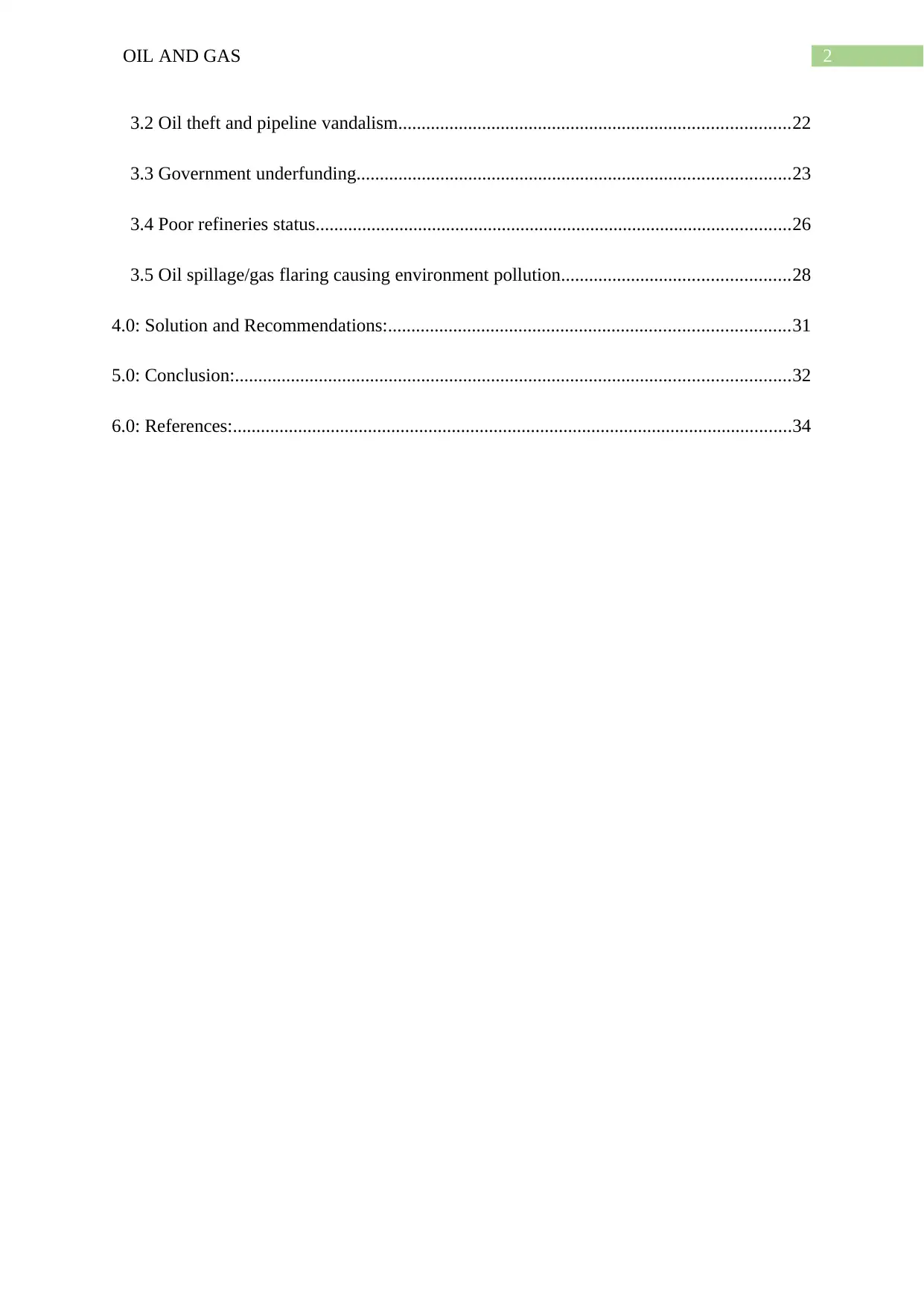
2OIL AND GAS
3.2 Oil theft and pipeline vandalism....................................................................................22
3.3 Government underfunding.............................................................................................23
3.4 Poor refineries status......................................................................................................26
3.5 Oil spillage/gas flaring causing environment pollution.................................................28
4.0: Solution and Recommendations:......................................................................................31
5.0: Conclusion:.......................................................................................................................32
6.0: References:........................................................................................................................34
3.2 Oil theft and pipeline vandalism....................................................................................22
3.3 Government underfunding.............................................................................................23
3.4 Poor refineries status......................................................................................................26
3.5 Oil spillage/gas flaring causing environment pollution.................................................28
4.0: Solution and Recommendations:......................................................................................31
5.0: Conclusion:.......................................................................................................................32
6.0: References:........................................................................................................................34
⊘ This is a preview!⊘
Do you want full access?
Subscribe today to unlock all pages.

Trusted by 1+ million students worldwide
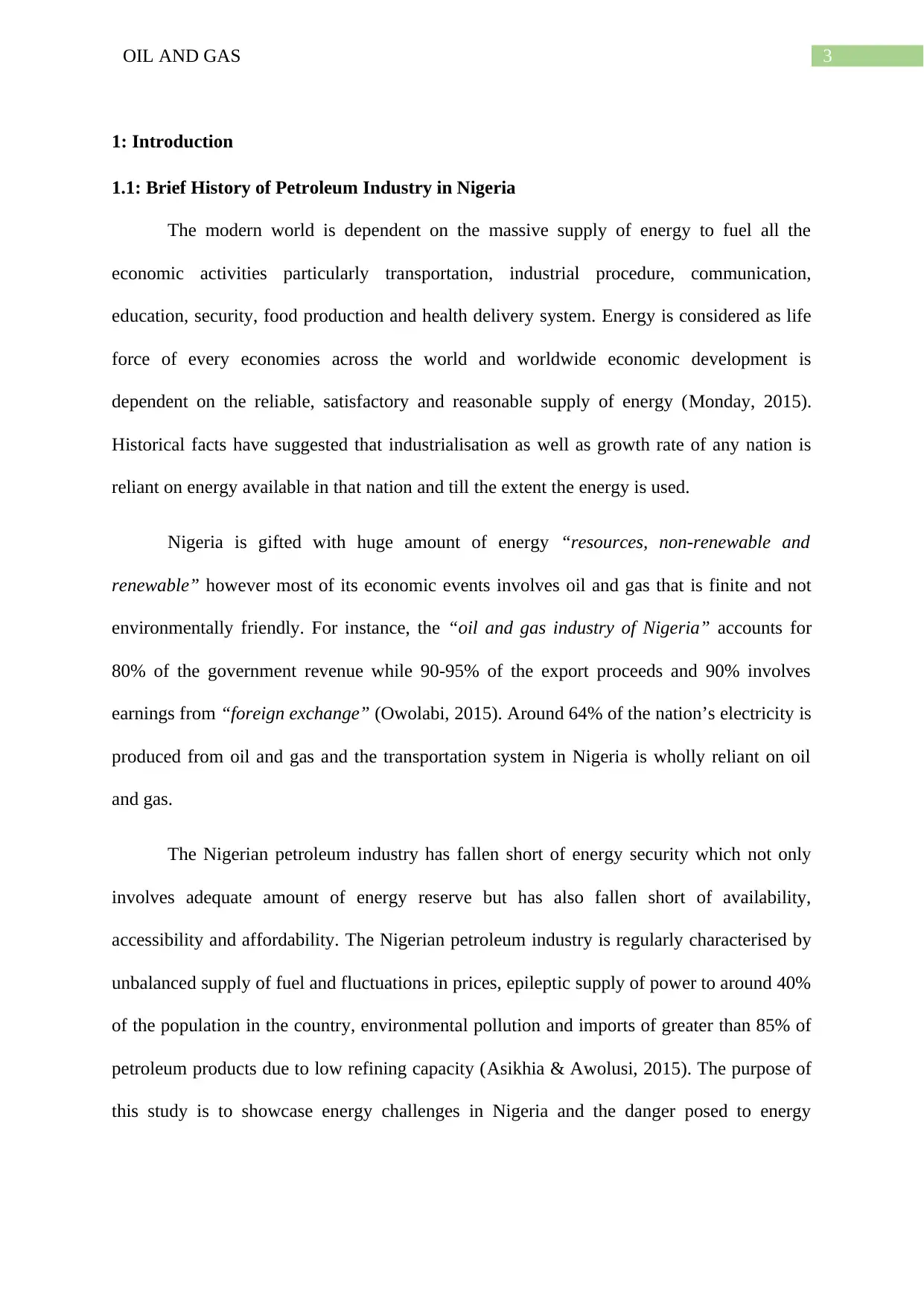
3OIL AND GAS
1: Introduction
1.1: Brief History of Petroleum Industry in Nigeria
The modern world is dependent on the massive supply of energy to fuel all the
economic activities particularly transportation, industrial procedure, communication,
education, security, food production and health delivery system. Energy is considered as life
force of every economies across the world and worldwide economic development is
dependent on the reliable, satisfactory and reasonable supply of energy (Monday, 2015).
Historical facts have suggested that industrialisation as well as growth rate of any nation is
reliant on energy available in that nation and till the extent the energy is used.
Nigeria is gifted with huge amount of energy “resources, non-renewable and
renewable” however most of its economic events involves oil and gas that is finite and not
environmentally friendly. For instance, the “oil and gas industry of Nigeria” accounts for
80% of the government revenue while 90-95% of the export proceeds and 90% involves
earnings from “foreign exchange” (Owolabi, 2015). Around 64% of the nation’s electricity is
produced from oil and gas and the transportation system in Nigeria is wholly reliant on oil
and gas.
The Nigerian petroleum industry has fallen short of energy security which not only
involves adequate amount of energy reserve but has also fallen short of availability,
accessibility and affordability. The Nigerian petroleum industry is regularly characterised by
unbalanced supply of fuel and fluctuations in prices, epileptic supply of power to around 40%
of the population in the country, environmental pollution and imports of greater than 85% of
petroleum products due to low refining capacity (Asikhia & Awolusi, 2015). The purpose of
this study is to showcase energy challenges in Nigeria and the danger posed to energy
1: Introduction
1.1: Brief History of Petroleum Industry in Nigeria
The modern world is dependent on the massive supply of energy to fuel all the
economic activities particularly transportation, industrial procedure, communication,
education, security, food production and health delivery system. Energy is considered as life
force of every economies across the world and worldwide economic development is
dependent on the reliable, satisfactory and reasonable supply of energy (Monday, 2015).
Historical facts have suggested that industrialisation as well as growth rate of any nation is
reliant on energy available in that nation and till the extent the energy is used.
Nigeria is gifted with huge amount of energy “resources, non-renewable and
renewable” however most of its economic events involves oil and gas that is finite and not
environmentally friendly. For instance, the “oil and gas industry of Nigeria” accounts for
80% of the government revenue while 90-95% of the export proceeds and 90% involves
earnings from “foreign exchange” (Owolabi, 2015). Around 64% of the nation’s electricity is
produced from oil and gas and the transportation system in Nigeria is wholly reliant on oil
and gas.
The Nigerian petroleum industry has fallen short of energy security which not only
involves adequate amount of energy reserve but has also fallen short of availability,
accessibility and affordability. The Nigerian petroleum industry is regularly characterised by
unbalanced supply of fuel and fluctuations in prices, epileptic supply of power to around 40%
of the population in the country, environmental pollution and imports of greater than 85% of
petroleum products due to low refining capacity (Asikhia & Awolusi, 2015). The purpose of
this study is to showcase energy challenges in Nigeria and the danger posed to energy
Paraphrase This Document
Need a fresh take? Get an instant paraphrase of this document with our AI Paraphraser
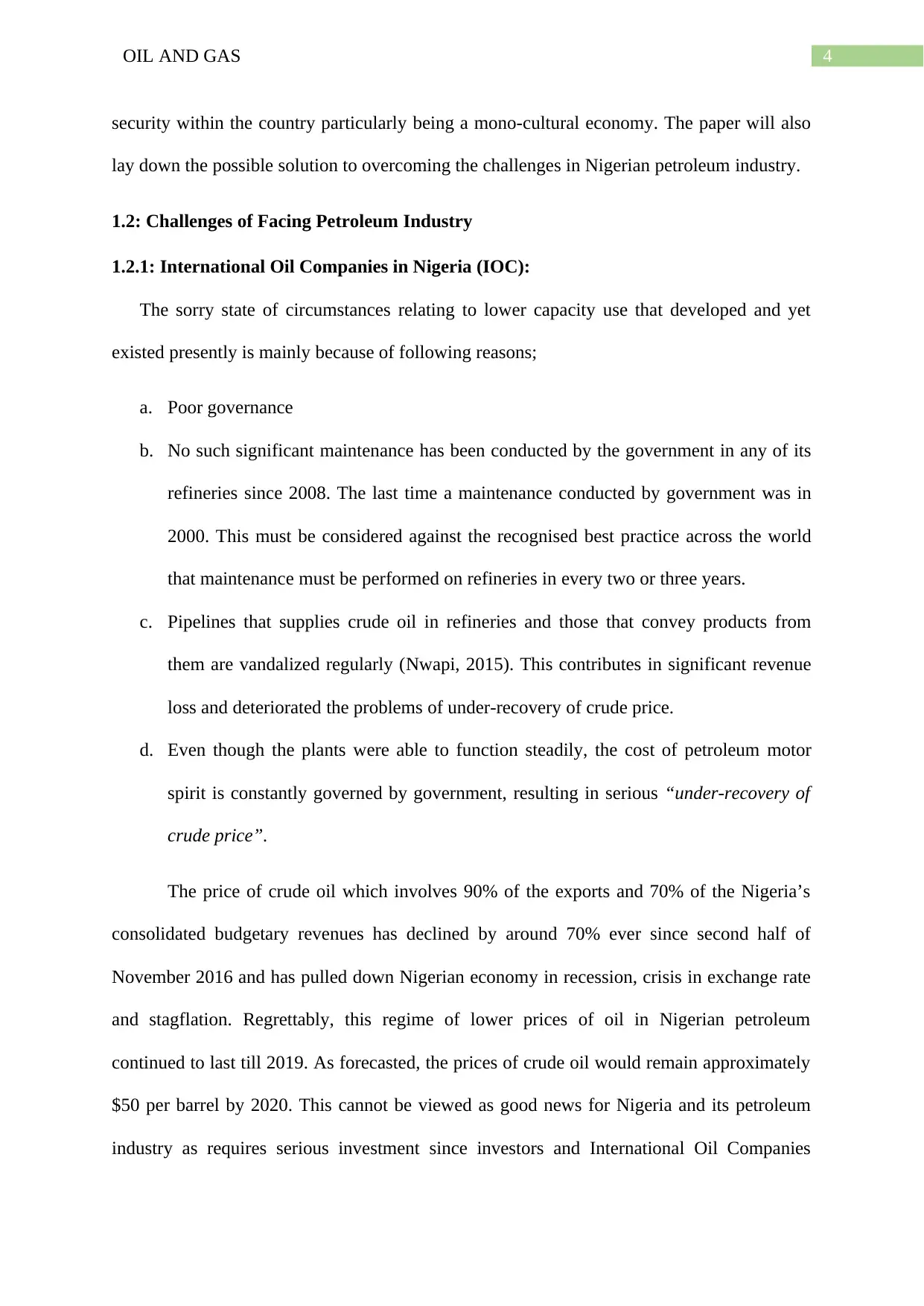
4OIL AND GAS
security within the country particularly being a mono-cultural economy. The paper will also
lay down the possible solution to overcoming the challenges in Nigerian petroleum industry.
1.2: Challenges of Facing Petroleum Industry
1.2.1: International Oil Companies in Nigeria (IOC):
The sorry state of circumstances relating to lower capacity use that developed and yet
existed presently is mainly because of following reasons;
a. Poor governance
b. No such significant maintenance has been conducted by the government in any of its
refineries since 2008. The last time a maintenance conducted by government was in
2000. This must be considered against the recognised best practice across the world
that maintenance must be performed on refineries in every two or three years.
c. Pipelines that supplies crude oil in refineries and those that convey products from
them are vandalized regularly (Nwapi, 2015). This contributes in significant revenue
loss and deteriorated the problems of under-recovery of crude price.
d. Even though the plants were able to function steadily, the cost of petroleum motor
spirit is constantly governed by government, resulting in serious “under-recovery of
crude price”.
The price of crude oil which involves 90% of the exports and 70% of the Nigeria’s
consolidated budgetary revenues has declined by around 70% ever since second half of
November 2016 and has pulled down Nigerian economy in recession, crisis in exchange rate
and stagflation. Regrettably, this regime of lower prices of oil in Nigerian petroleum
continued to last till 2019. As forecasted, the prices of crude oil would remain approximately
$50 per barrel by 2020. This cannot be viewed as good news for Nigeria and its petroleum
industry as requires serious investment since investors and International Oil Companies
security within the country particularly being a mono-cultural economy. The paper will also
lay down the possible solution to overcoming the challenges in Nigerian petroleum industry.
1.2: Challenges of Facing Petroleum Industry
1.2.1: International Oil Companies in Nigeria (IOC):
The sorry state of circumstances relating to lower capacity use that developed and yet
existed presently is mainly because of following reasons;
a. Poor governance
b. No such significant maintenance has been conducted by the government in any of its
refineries since 2008. The last time a maintenance conducted by government was in
2000. This must be considered against the recognised best practice across the world
that maintenance must be performed on refineries in every two or three years.
c. Pipelines that supplies crude oil in refineries and those that convey products from
them are vandalized regularly (Nwapi, 2015). This contributes in significant revenue
loss and deteriorated the problems of under-recovery of crude price.
d. Even though the plants were able to function steadily, the cost of petroleum motor
spirit is constantly governed by government, resulting in serious “under-recovery of
crude price”.
The price of crude oil which involves 90% of the exports and 70% of the Nigeria’s
consolidated budgetary revenues has declined by around 70% ever since second half of
November 2016 and has pulled down Nigerian economy in recession, crisis in exchange rate
and stagflation. Regrettably, this regime of lower prices of oil in Nigerian petroleum
continued to last till 2019. As forecasted, the prices of crude oil would remain approximately
$50 per barrel by 2020. This cannot be viewed as good news for Nigeria and its petroleum
industry as requires serious investment since investors and International Oil Companies
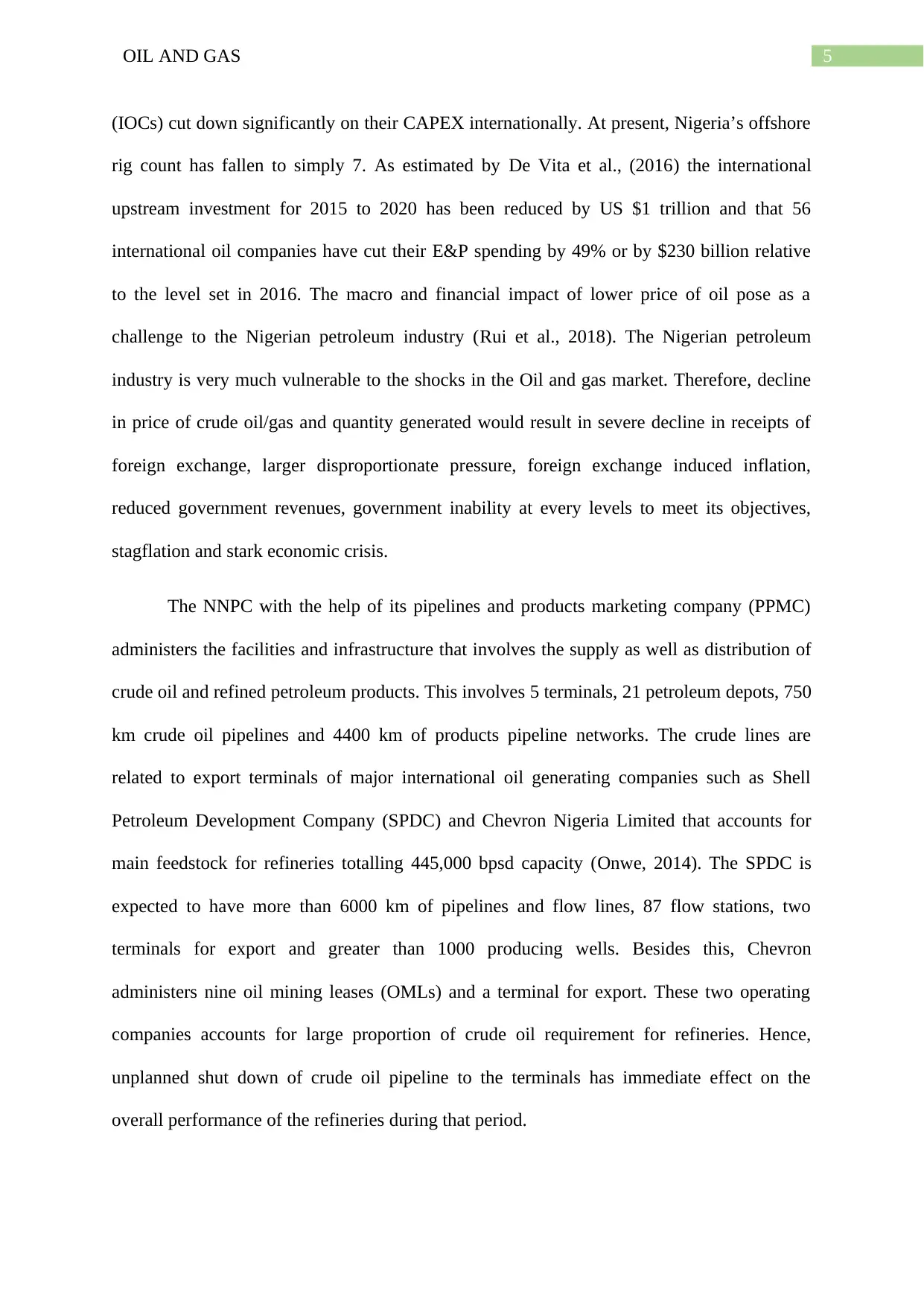
5OIL AND GAS
(IOCs) cut down significantly on their CAPEX internationally. At present, Nigeria’s offshore
rig count has fallen to simply 7. As estimated by De Vita et al., (2016) the international
upstream investment for 2015 to 2020 has been reduced by US $1 trillion and that 56
international oil companies have cut their E&P spending by 49% or by $230 billion relative
to the level set in 2016. The macro and financial impact of lower price of oil pose as a
challenge to the Nigerian petroleum industry (Rui et al., 2018). The Nigerian petroleum
industry is very much vulnerable to the shocks in the Oil and gas market. Therefore, decline
in price of crude oil/gas and quantity generated would result in severe decline in receipts of
foreign exchange, larger disproportionate pressure, foreign exchange induced inflation,
reduced government revenues, government inability at every levels to meet its objectives,
stagflation and stark economic crisis.
The NNPC with the help of its pipelines and products marketing company (PPMC)
administers the facilities and infrastructure that involves the supply as well as distribution of
crude oil and refined petroleum products. This involves 5 terminals, 21 petroleum depots, 750
km crude oil pipelines and 4400 km of products pipeline networks. The crude lines are
related to export terminals of major international oil generating companies such as Shell
Petroleum Development Company (SPDC) and Chevron Nigeria Limited that accounts for
main feedstock for refineries totalling 445,000 bpsd capacity (Onwe, 2014). The SPDC is
expected to have more than 6000 km of pipelines and flow lines, 87 flow stations, two
terminals for export and greater than 1000 producing wells. Besides this, Chevron
administers nine oil mining leases (OMLs) and a terminal for export. These two operating
companies accounts for large proportion of crude oil requirement for refineries. Hence,
unplanned shut down of crude oil pipeline to the terminals has immediate effect on the
overall performance of the refineries during that period.
(IOCs) cut down significantly on their CAPEX internationally. At present, Nigeria’s offshore
rig count has fallen to simply 7. As estimated by De Vita et al., (2016) the international
upstream investment for 2015 to 2020 has been reduced by US $1 trillion and that 56
international oil companies have cut their E&P spending by 49% or by $230 billion relative
to the level set in 2016. The macro and financial impact of lower price of oil pose as a
challenge to the Nigerian petroleum industry (Rui et al., 2018). The Nigerian petroleum
industry is very much vulnerable to the shocks in the Oil and gas market. Therefore, decline
in price of crude oil/gas and quantity generated would result in severe decline in receipts of
foreign exchange, larger disproportionate pressure, foreign exchange induced inflation,
reduced government revenues, government inability at every levels to meet its objectives,
stagflation and stark economic crisis.
The NNPC with the help of its pipelines and products marketing company (PPMC)
administers the facilities and infrastructure that involves the supply as well as distribution of
crude oil and refined petroleum products. This involves 5 terminals, 21 petroleum depots, 750
km crude oil pipelines and 4400 km of products pipeline networks. The crude lines are
related to export terminals of major international oil generating companies such as Shell
Petroleum Development Company (SPDC) and Chevron Nigeria Limited that accounts for
main feedstock for refineries totalling 445,000 bpsd capacity (Onwe, 2014). The SPDC is
expected to have more than 6000 km of pipelines and flow lines, 87 flow stations, two
terminals for export and greater than 1000 producing wells. Besides this, Chevron
administers nine oil mining leases (OMLs) and a terminal for export. These two operating
companies accounts for large proportion of crude oil requirement for refineries. Hence,
unplanned shut down of crude oil pipeline to the terminals has immediate effect on the
overall performance of the refineries during that period.
⊘ This is a preview!⊘
Do you want full access?
Subscribe today to unlock all pages.

Trusted by 1+ million students worldwide
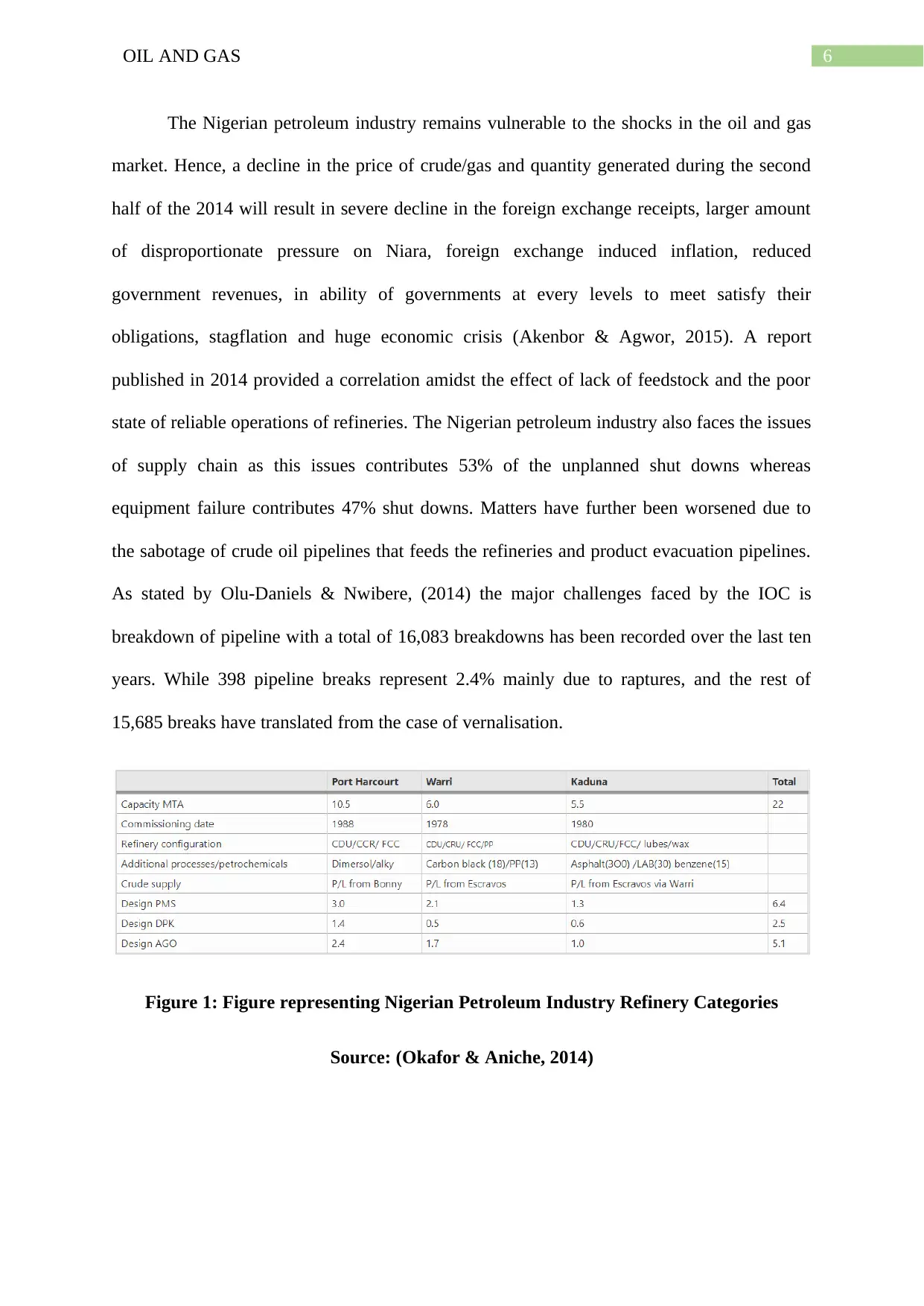
6OIL AND GAS
The Nigerian petroleum industry remains vulnerable to the shocks in the oil and gas
market. Hence, a decline in the price of crude/gas and quantity generated during the second
half of the 2014 will result in severe decline in the foreign exchange receipts, larger amount
of disproportionate pressure on Niara, foreign exchange induced inflation, reduced
government revenues, in ability of governments at every levels to meet satisfy their
obligations, stagflation and huge economic crisis (Akenbor & Agwor, 2015). A report
published in 2014 provided a correlation amidst the effect of lack of feedstock and the poor
state of reliable operations of refineries. The Nigerian petroleum industry also faces the issues
of supply chain as this issues contributes 53% of the unplanned shut downs whereas
equipment failure contributes 47% shut downs. Matters have further been worsened due to
the sabotage of crude oil pipelines that feeds the refineries and product evacuation pipelines.
As stated by Olu-Daniels & Nwibere, (2014) the major challenges faced by the IOC is
breakdown of pipeline with a total of 16,083 breakdowns has been recorded over the last ten
years. While 398 pipeline breaks represent 2.4% mainly due to raptures, and the rest of
15,685 breaks have translated from the case of vernalisation.
Figure 1: Figure representing Nigerian Petroleum Industry Refinery Categories
Source: (Okafor & Aniche, 2014)
The Nigerian petroleum industry remains vulnerable to the shocks in the oil and gas
market. Hence, a decline in the price of crude/gas and quantity generated during the second
half of the 2014 will result in severe decline in the foreign exchange receipts, larger amount
of disproportionate pressure on Niara, foreign exchange induced inflation, reduced
government revenues, in ability of governments at every levels to meet satisfy their
obligations, stagflation and huge economic crisis (Akenbor & Agwor, 2015). A report
published in 2014 provided a correlation amidst the effect of lack of feedstock and the poor
state of reliable operations of refineries. The Nigerian petroleum industry also faces the issues
of supply chain as this issues contributes 53% of the unplanned shut downs whereas
equipment failure contributes 47% shut downs. Matters have further been worsened due to
the sabotage of crude oil pipelines that feeds the refineries and product evacuation pipelines.
As stated by Olu-Daniels & Nwibere, (2014) the major challenges faced by the IOC is
breakdown of pipeline with a total of 16,083 breakdowns has been recorded over the last ten
years. While 398 pipeline breaks represent 2.4% mainly due to raptures, and the rest of
15,685 breaks have translated from the case of vernalisation.
Figure 1: Figure representing Nigerian Petroleum Industry Refinery Categories
Source: (Okafor & Aniche, 2014)
Paraphrase This Document
Need a fresh take? Get an instant paraphrase of this document with our AI Paraphraser
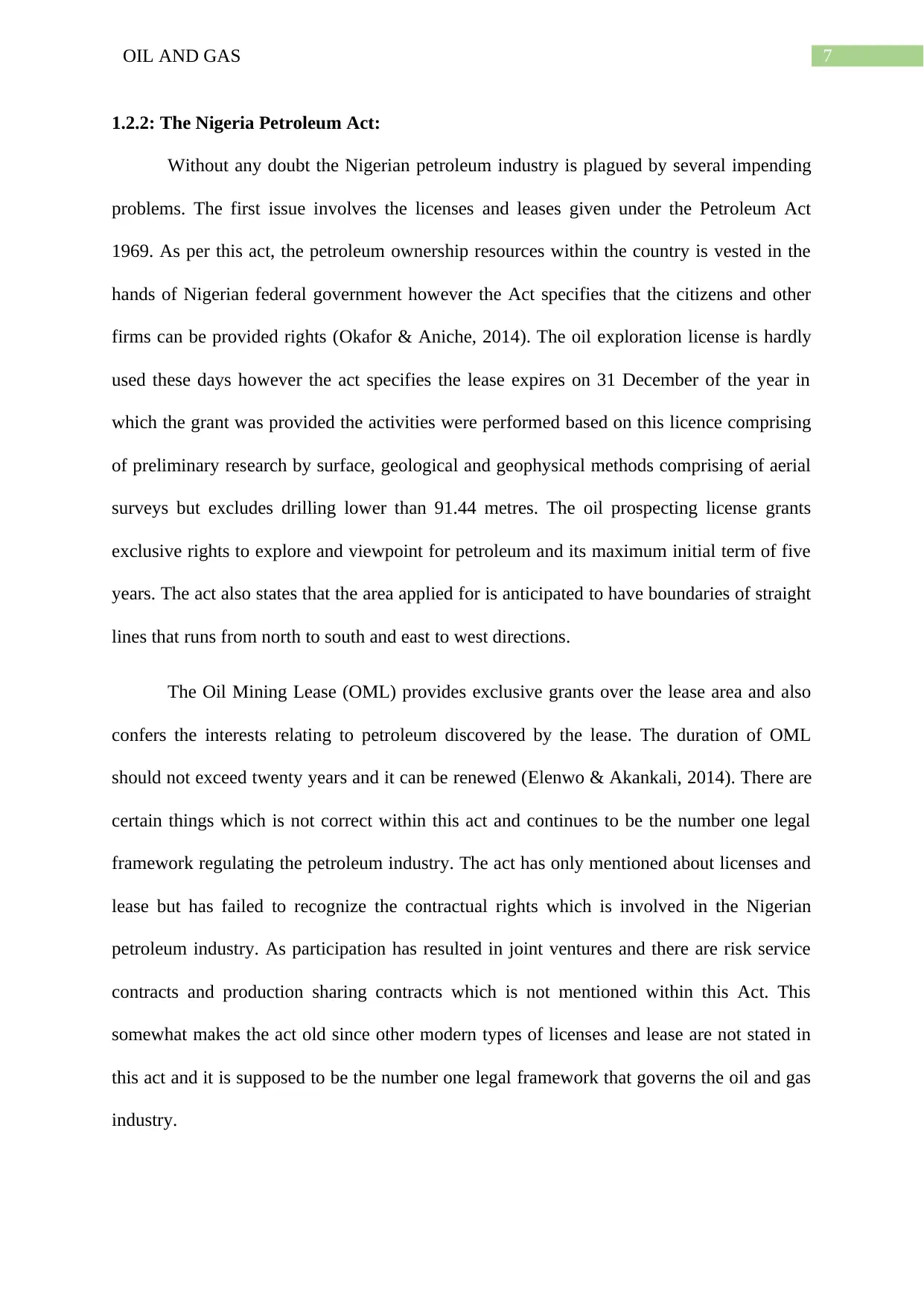
7OIL AND GAS
1.2.2: The Nigeria Petroleum Act:
Without any doubt the Nigerian petroleum industry is plagued by several impending
problems. The first issue involves the licenses and leases given under the Petroleum Act
1969. As per this act, the petroleum ownership resources within the country is vested in the
hands of Nigerian federal government however the Act specifies that the citizens and other
firms can be provided rights (Okafor & Aniche, 2014). The oil exploration license is hardly
used these days however the act specifies the lease expires on 31 December of the year in
which the grant was provided the activities were performed based on this licence comprising
of preliminary research by surface, geological and geophysical methods comprising of aerial
surveys but excludes drilling lower than 91.44 metres. The oil prospecting license grants
exclusive rights to explore and viewpoint for petroleum and its maximum initial term of five
years. The act also states that the area applied for is anticipated to have boundaries of straight
lines that runs from north to south and east to west directions.
The Oil Mining Lease (OML) provides exclusive grants over the lease area and also
confers the interests relating to petroleum discovered by the lease. The duration of OML
should not exceed twenty years and it can be renewed (Elenwo & Akankali, 2014). There are
certain things which is not correct within this act and continues to be the number one legal
framework regulating the petroleum industry. The act has only mentioned about licenses and
lease but has failed to recognize the contractual rights which is involved in the Nigerian
petroleum industry. As participation has resulted in joint ventures and there are risk service
contracts and production sharing contracts which is not mentioned within this Act. This
somewhat makes the act old since other modern types of licenses and lease are not stated in
this act and it is supposed to be the number one legal framework that governs the oil and gas
industry.
1.2.2: The Nigeria Petroleum Act:
Without any doubt the Nigerian petroleum industry is plagued by several impending
problems. The first issue involves the licenses and leases given under the Petroleum Act
1969. As per this act, the petroleum ownership resources within the country is vested in the
hands of Nigerian federal government however the Act specifies that the citizens and other
firms can be provided rights (Okafor & Aniche, 2014). The oil exploration license is hardly
used these days however the act specifies the lease expires on 31 December of the year in
which the grant was provided the activities were performed based on this licence comprising
of preliminary research by surface, geological and geophysical methods comprising of aerial
surveys but excludes drilling lower than 91.44 metres. The oil prospecting license grants
exclusive rights to explore and viewpoint for petroleum and its maximum initial term of five
years. The act also states that the area applied for is anticipated to have boundaries of straight
lines that runs from north to south and east to west directions.
The Oil Mining Lease (OML) provides exclusive grants over the lease area and also
confers the interests relating to petroleum discovered by the lease. The duration of OML
should not exceed twenty years and it can be renewed (Elenwo & Akankali, 2014). There are
certain things which is not correct within this act and continues to be the number one legal
framework regulating the petroleum industry. The act has only mentioned about licenses and
lease but has failed to recognize the contractual rights which is involved in the Nigerian
petroleum industry. As participation has resulted in joint ventures and there are risk service
contracts and production sharing contracts which is not mentioned within this Act. This
somewhat makes the act old since other modern types of licenses and lease are not stated in
this act and it is supposed to be the number one legal framework that governs the oil and gas
industry.
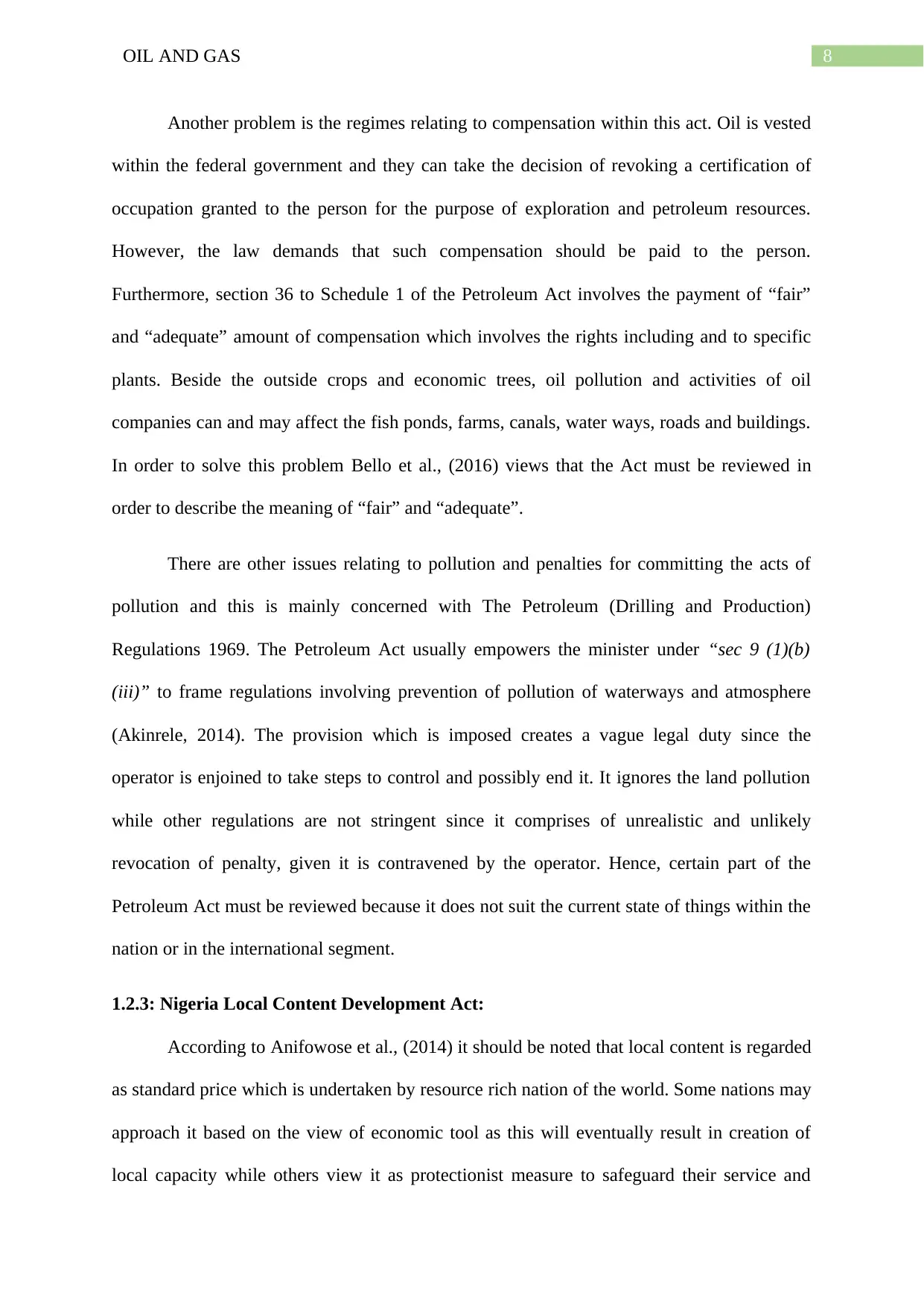
8OIL AND GAS
Another problem is the regimes relating to compensation within this act. Oil is vested
within the federal government and they can take the decision of revoking a certification of
occupation granted to the person for the purpose of exploration and petroleum resources.
However, the law demands that such compensation should be paid to the person.
Furthermore, section 36 to Schedule 1 of the Petroleum Act involves the payment of “fair”
and “adequate” amount of compensation which involves the rights including and to specific
plants. Beside the outside crops and economic trees, oil pollution and activities of oil
companies can and may affect the fish ponds, farms, canals, water ways, roads and buildings.
In order to solve this problem Bello et al., (2016) views that the Act must be reviewed in
order to describe the meaning of “fair” and “adequate”.
There are other issues relating to pollution and penalties for committing the acts of
pollution and this is mainly concerned with The Petroleum (Drilling and Production)
Regulations 1969. The Petroleum Act usually empowers the minister under “sec 9 (1)(b)
(iii)” to frame regulations involving prevention of pollution of waterways and atmosphere
(Akinrele, 2014). The provision which is imposed creates a vague legal duty since the
operator is enjoined to take steps to control and possibly end it. It ignores the land pollution
while other regulations are not stringent since it comprises of unrealistic and unlikely
revocation of penalty, given it is contravened by the operator. Hence, certain part of the
Petroleum Act must be reviewed because it does not suit the current state of things within the
nation or in the international segment.
1.2.3: Nigeria Local Content Development Act:
According to Anifowose et al., (2014) it should be noted that local content is regarded
as standard price which is undertaken by resource rich nation of the world. Some nations may
approach it based on the view of economic tool as this will eventually result in creation of
local capacity while others view it as protectionist measure to safeguard their service and
Another problem is the regimes relating to compensation within this act. Oil is vested
within the federal government and they can take the decision of revoking a certification of
occupation granted to the person for the purpose of exploration and petroleum resources.
However, the law demands that such compensation should be paid to the person.
Furthermore, section 36 to Schedule 1 of the Petroleum Act involves the payment of “fair”
and “adequate” amount of compensation which involves the rights including and to specific
plants. Beside the outside crops and economic trees, oil pollution and activities of oil
companies can and may affect the fish ponds, farms, canals, water ways, roads and buildings.
In order to solve this problem Bello et al., (2016) views that the Act must be reviewed in
order to describe the meaning of “fair” and “adequate”.
There are other issues relating to pollution and penalties for committing the acts of
pollution and this is mainly concerned with The Petroleum (Drilling and Production)
Regulations 1969. The Petroleum Act usually empowers the minister under “sec 9 (1)(b)
(iii)” to frame regulations involving prevention of pollution of waterways and atmosphere
(Akinrele, 2014). The provision which is imposed creates a vague legal duty since the
operator is enjoined to take steps to control and possibly end it. It ignores the land pollution
while other regulations are not stringent since it comprises of unrealistic and unlikely
revocation of penalty, given it is contravened by the operator. Hence, certain part of the
Petroleum Act must be reviewed because it does not suit the current state of things within the
nation or in the international segment.
1.2.3: Nigeria Local Content Development Act:
According to Anifowose et al., (2014) it should be noted that local content is regarded
as standard price which is undertaken by resource rich nation of the world. Some nations may
approach it based on the view of economic tool as this will eventually result in creation of
local capacity while others view it as protectionist measure to safeguard their service and
⊘ This is a preview!⊘
Do you want full access?
Subscribe today to unlock all pages.

Trusted by 1+ million students worldwide
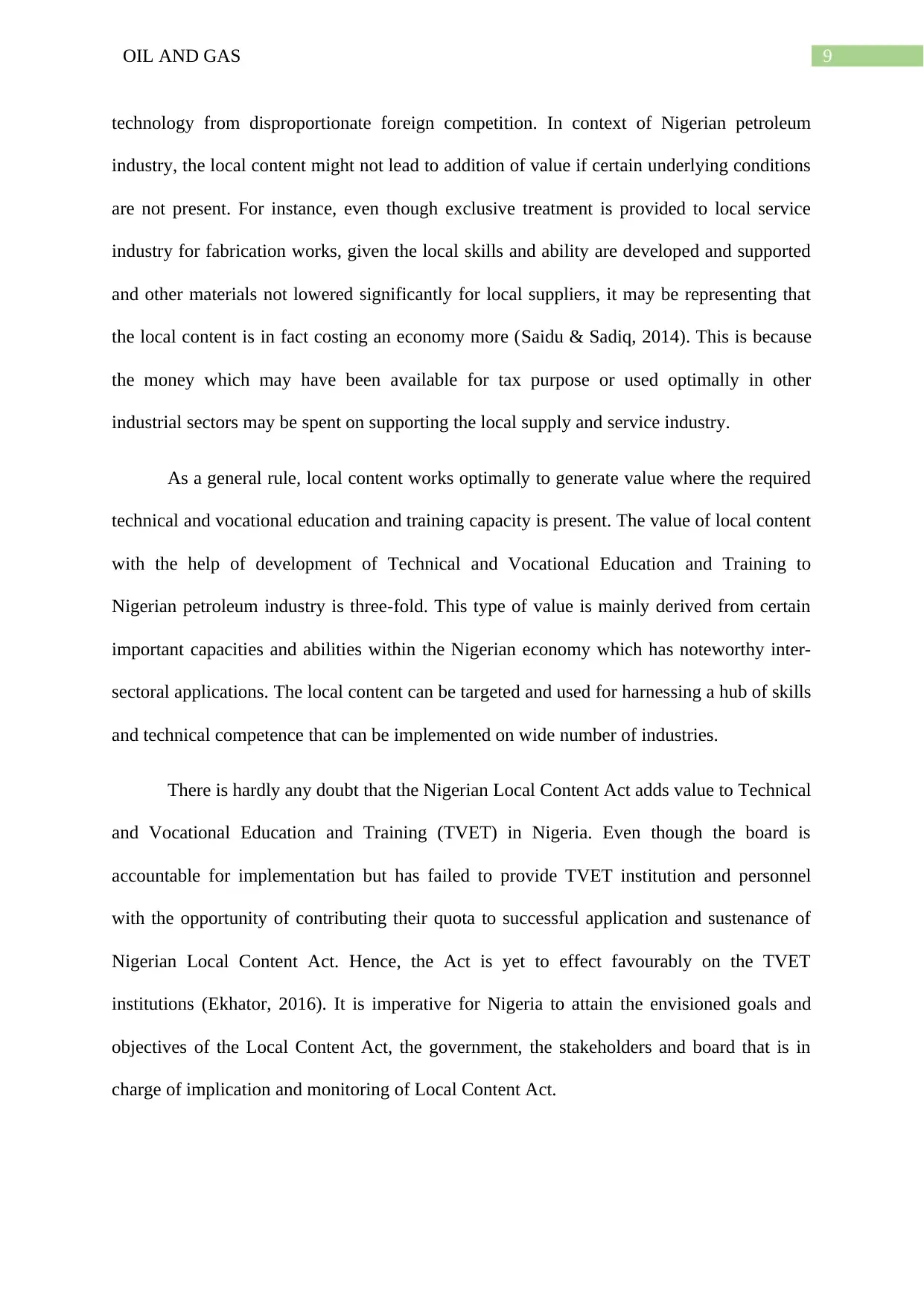
9OIL AND GAS
technology from disproportionate foreign competition. In context of Nigerian petroleum
industry, the local content might not lead to addition of value if certain underlying conditions
are not present. For instance, even though exclusive treatment is provided to local service
industry for fabrication works, given the local skills and ability are developed and supported
and other materials not lowered significantly for local suppliers, it may be representing that
the local content is in fact costing an economy more (Saidu & Sadiq, 2014). This is because
the money which may have been available for tax purpose or used optimally in other
industrial sectors may be spent on supporting the local supply and service industry.
As a general rule, local content works optimally to generate value where the required
technical and vocational education and training capacity is present. The value of local content
with the help of development of Technical and Vocational Education and Training to
Nigerian petroleum industry is three-fold. This type of value is mainly derived from certain
important capacities and abilities within the Nigerian economy which has noteworthy inter-
sectoral applications. The local content can be targeted and used for harnessing a hub of skills
and technical competence that can be implemented on wide number of industries.
There is hardly any doubt that the Nigerian Local Content Act adds value to Technical
and Vocational Education and Training (TVET) in Nigeria. Even though the board is
accountable for implementation but has failed to provide TVET institution and personnel
with the opportunity of contributing their quota to successful application and sustenance of
Nigerian Local Content Act. Hence, the Act is yet to effect favourably on the TVET
institutions (Ekhator, 2016). It is imperative for Nigeria to attain the envisioned goals and
objectives of the Local Content Act, the government, the stakeholders and board that is in
charge of implication and monitoring of Local Content Act.
technology from disproportionate foreign competition. In context of Nigerian petroleum
industry, the local content might not lead to addition of value if certain underlying conditions
are not present. For instance, even though exclusive treatment is provided to local service
industry for fabrication works, given the local skills and ability are developed and supported
and other materials not lowered significantly for local suppliers, it may be representing that
the local content is in fact costing an economy more (Saidu & Sadiq, 2014). This is because
the money which may have been available for tax purpose or used optimally in other
industrial sectors may be spent on supporting the local supply and service industry.
As a general rule, local content works optimally to generate value where the required
technical and vocational education and training capacity is present. The value of local content
with the help of development of Technical and Vocational Education and Training to
Nigerian petroleum industry is three-fold. This type of value is mainly derived from certain
important capacities and abilities within the Nigerian economy which has noteworthy inter-
sectoral applications. The local content can be targeted and used for harnessing a hub of skills
and technical competence that can be implemented on wide number of industries.
There is hardly any doubt that the Nigerian Local Content Act adds value to Technical
and Vocational Education and Training (TVET) in Nigeria. Even though the board is
accountable for implementation but has failed to provide TVET institution and personnel
with the opportunity of contributing their quota to successful application and sustenance of
Nigerian Local Content Act. Hence, the Act is yet to effect favourably on the TVET
institutions (Ekhator, 2016). It is imperative for Nigeria to attain the envisioned goals and
objectives of the Local Content Act, the government, the stakeholders and board that is in
charge of implication and monitoring of Local Content Act.
Paraphrase This Document
Need a fresh take? Get an instant paraphrase of this document with our AI Paraphraser
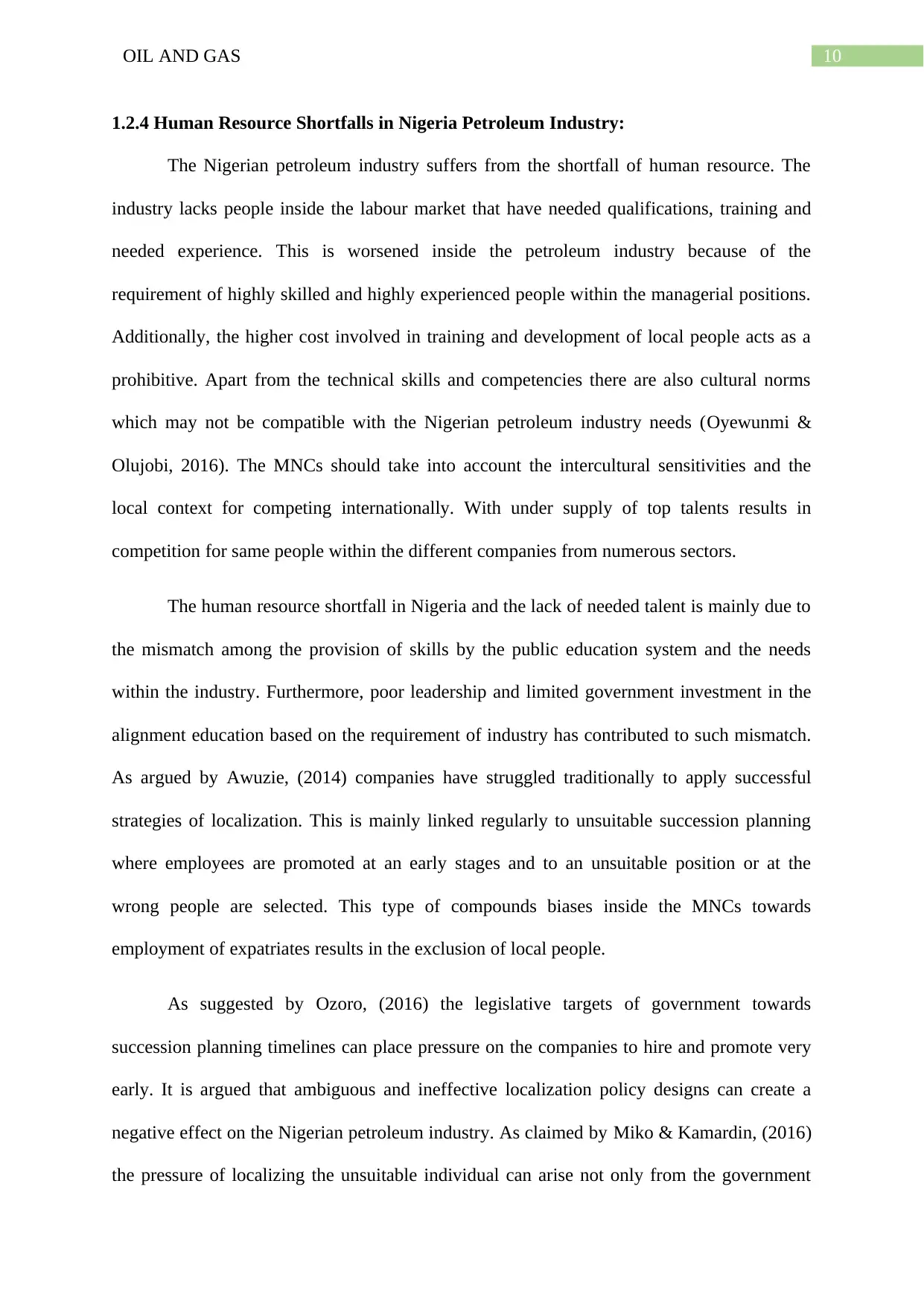
10OIL AND GAS
1.2.4 Human Resource Shortfalls in Nigeria Petroleum Industry:
The Nigerian petroleum industry suffers from the shortfall of human resource. The
industry lacks people inside the labour market that have needed qualifications, training and
needed experience. This is worsened inside the petroleum industry because of the
requirement of highly skilled and highly experienced people within the managerial positions.
Additionally, the higher cost involved in training and development of local people acts as a
prohibitive. Apart from the technical skills and competencies there are also cultural norms
which may not be compatible with the Nigerian petroleum industry needs (Oyewunmi &
Olujobi, 2016). The MNCs should take into account the intercultural sensitivities and the
local context for competing internationally. With under supply of top talents results in
competition for same people within the different companies from numerous sectors.
The human resource shortfall in Nigeria and the lack of needed talent is mainly due to
the mismatch among the provision of skills by the public education system and the needs
within the industry. Furthermore, poor leadership and limited government investment in the
alignment education based on the requirement of industry has contributed to such mismatch.
As argued by Awuzie, (2014) companies have struggled traditionally to apply successful
strategies of localization. This is mainly linked regularly to unsuitable succession planning
where employees are promoted at an early stages and to an unsuitable position or at the
wrong people are selected. This type of compounds biases inside the MNCs towards
employment of expatriates results in the exclusion of local people.
As suggested by Ozoro, (2016) the legislative targets of government towards
succession planning timelines can place pressure on the companies to hire and promote very
early. It is argued that ambiguous and ineffective localization policy designs can create a
negative effect on the Nigerian petroleum industry. As claimed by Miko & Kamardin, (2016)
the pressure of localizing the unsuitable individual can arise not only from the government
1.2.4 Human Resource Shortfalls in Nigeria Petroleum Industry:
The Nigerian petroleum industry suffers from the shortfall of human resource. The
industry lacks people inside the labour market that have needed qualifications, training and
needed experience. This is worsened inside the petroleum industry because of the
requirement of highly skilled and highly experienced people within the managerial positions.
Additionally, the higher cost involved in training and development of local people acts as a
prohibitive. Apart from the technical skills and competencies there are also cultural norms
which may not be compatible with the Nigerian petroleum industry needs (Oyewunmi &
Olujobi, 2016). The MNCs should take into account the intercultural sensitivities and the
local context for competing internationally. With under supply of top talents results in
competition for same people within the different companies from numerous sectors.
The human resource shortfall in Nigeria and the lack of needed talent is mainly due to
the mismatch among the provision of skills by the public education system and the needs
within the industry. Furthermore, poor leadership and limited government investment in the
alignment education based on the requirement of industry has contributed to such mismatch.
As argued by Awuzie, (2014) companies have struggled traditionally to apply successful
strategies of localization. This is mainly linked regularly to unsuitable succession planning
where employees are promoted at an early stages and to an unsuitable position or at the
wrong people are selected. This type of compounds biases inside the MNCs towards
employment of expatriates results in the exclusion of local people.
As suggested by Ozoro, (2016) the legislative targets of government towards
succession planning timelines can place pressure on the companies to hire and promote very
early. It is argued that ambiguous and ineffective localization policy designs can create a
negative effect on the Nigerian petroleum industry. As claimed by Miko & Kamardin, (2016)
the pressure of localizing the unsuitable individual can arise not only from the government
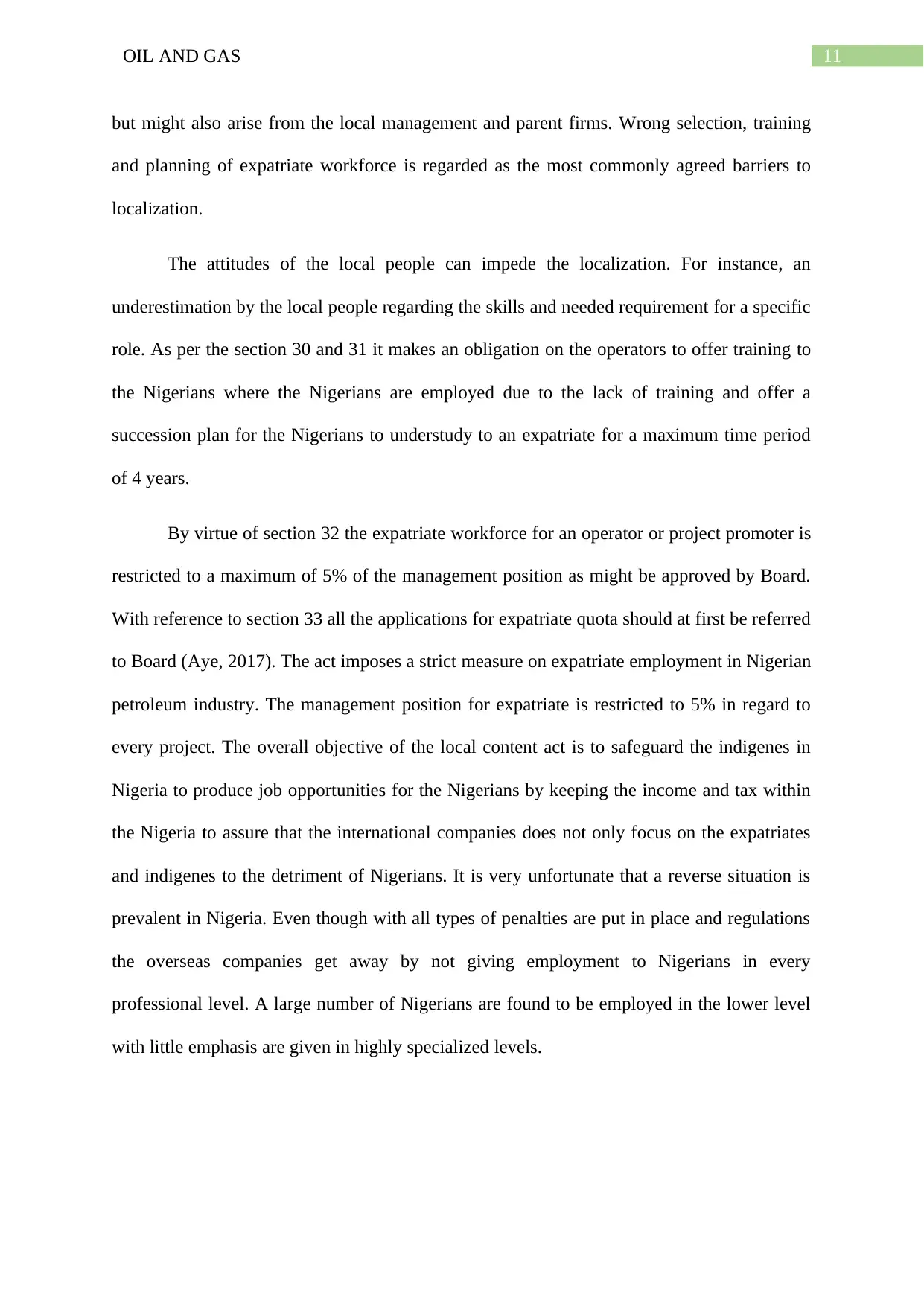
11OIL AND GAS
but might also arise from the local management and parent firms. Wrong selection, training
and planning of expatriate workforce is regarded as the most commonly agreed barriers to
localization.
The attitudes of the local people can impede the localization. For instance, an
underestimation by the local people regarding the skills and needed requirement for a specific
role. As per the section 30 and 31 it makes an obligation on the operators to offer training to
the Nigerians where the Nigerians are employed due to the lack of training and offer a
succession plan for the Nigerians to understudy to an expatriate for a maximum time period
of 4 years.
By virtue of section 32 the expatriate workforce for an operator or project promoter is
restricted to a maximum of 5% of the management position as might be approved by Board.
With reference to section 33 all the applications for expatriate quota should at first be referred
to Board (Aye, 2017). The act imposes a strict measure on expatriate employment in Nigerian
petroleum industry. The management position for expatriate is restricted to 5% in regard to
every project. The overall objective of the local content act is to safeguard the indigenes in
Nigeria to produce job opportunities for the Nigerians by keeping the income and tax within
the Nigeria to assure that the international companies does not only focus on the expatriates
and indigenes to the detriment of Nigerians. It is very unfortunate that a reverse situation is
prevalent in Nigeria. Even though with all types of penalties are put in place and regulations
the overseas companies get away by not giving employment to Nigerians in every
professional level. A large number of Nigerians are found to be employed in the lower level
with little emphasis are given in highly specialized levels.
but might also arise from the local management and parent firms. Wrong selection, training
and planning of expatriate workforce is regarded as the most commonly agreed barriers to
localization.
The attitudes of the local people can impede the localization. For instance, an
underestimation by the local people regarding the skills and needed requirement for a specific
role. As per the section 30 and 31 it makes an obligation on the operators to offer training to
the Nigerians where the Nigerians are employed due to the lack of training and offer a
succession plan for the Nigerians to understudy to an expatriate for a maximum time period
of 4 years.
By virtue of section 32 the expatriate workforce for an operator or project promoter is
restricted to a maximum of 5% of the management position as might be approved by Board.
With reference to section 33 all the applications for expatriate quota should at first be referred
to Board (Aye, 2017). The act imposes a strict measure on expatriate employment in Nigerian
petroleum industry. The management position for expatriate is restricted to 5% in regard to
every project. The overall objective of the local content act is to safeguard the indigenes in
Nigeria to produce job opportunities for the Nigerians by keeping the income and tax within
the Nigeria to assure that the international companies does not only focus on the expatriates
and indigenes to the detriment of Nigerians. It is very unfortunate that a reverse situation is
prevalent in Nigeria. Even though with all types of penalties are put in place and regulations
the overseas companies get away by not giving employment to Nigerians in every
professional level. A large number of Nigerians are found to be employed in the lower level
with little emphasis are given in highly specialized levels.
⊘ This is a preview!⊘
Do you want full access?
Subscribe today to unlock all pages.

Trusted by 1+ million students worldwide
1 out of 44
Your All-in-One AI-Powered Toolkit for Academic Success.
+13062052269
info@desklib.com
Available 24*7 on WhatsApp / Email
![[object Object]](/_next/static/media/star-bottom.7253800d.svg)
Unlock your academic potential
Copyright © 2020–2026 A2Z Services. All Rights Reserved. Developed and managed by ZUCOL.